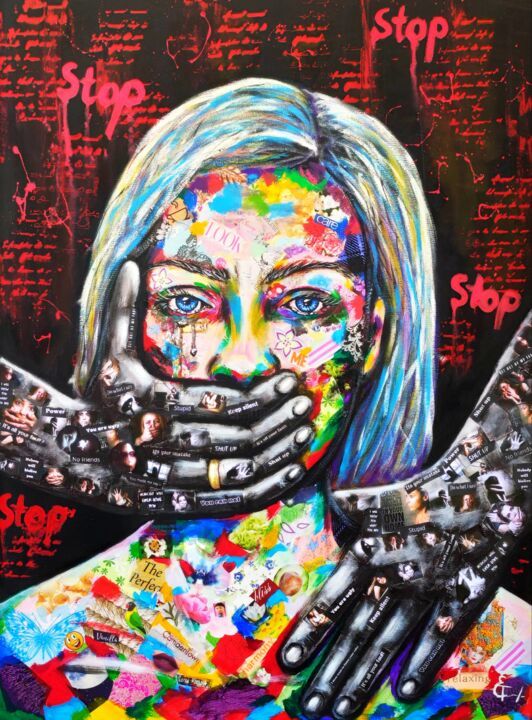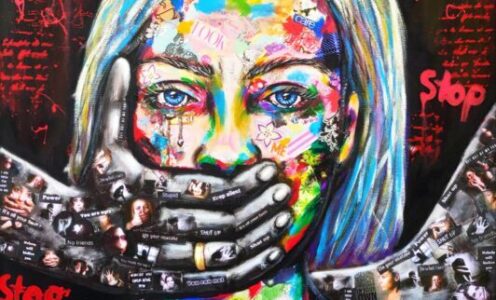They are ready to humiliate us with further abuse.
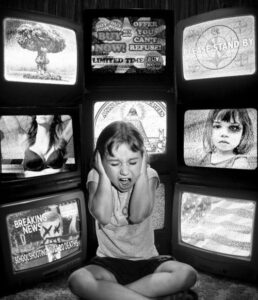 In the endlessly unfolding apocalyptic drama leading up to this supposed New Age Era that we are being led into, the mainstream narrative has once again begun to play to the beat of a certain fictional and dangerous microbe that we all know all too well. I said this months ago. They would try to hypnotise us again with this fear ridden narrative or something to that effect. And it seems that we are here now, at this point in the present. They are ready to humiliate us with further abuse and they intend to try and force us once again into submission. But before I go any further and go a little deeper into issues that I have already written about, I would like to dedicate and focus our attention on the issues of boundaries, abuse, trauma as well as dissociative disorders in order to set the ground for what I would like to present. This post is a little longer than previous ones because of the need to explain certain terminology. As a species that has been forced to normalise a certain systemic way of life and all the abuse that goes with it, I thought it appropriate to address these issues in a brief manner and extrapolate a little on how they relate to our collective existence given our current predicament, as well as raising some questions accordingly.
In the endlessly unfolding apocalyptic drama leading up to this supposed New Age Era that we are being led into, the mainstream narrative has once again begun to play to the beat of a certain fictional and dangerous microbe that we all know all too well. I said this months ago. They would try to hypnotise us again with this fear ridden narrative or something to that effect. And it seems that we are here now, at this point in the present. They are ready to humiliate us with further abuse and they intend to try and force us once again into submission. But before I go any further and go a little deeper into issues that I have already written about, I would like to dedicate and focus our attention on the issues of boundaries, abuse, trauma as well as dissociative disorders in order to set the ground for what I would like to present. This post is a little longer than previous ones because of the need to explain certain terminology. As a species that has been forced to normalise a certain systemic way of life and all the abuse that goes with it, I thought it appropriate to address these issues in a brief manner and extrapolate a little on how they relate to our collective existence given our current predicament, as well as raising some questions accordingly.
Boundaries help to define where one person ends and another begins.
 Boundaries protect a person’s personal space, whether that space is physical, mental or emotional, like fences that give neighbours privacy and help them feel safe. So, we could say that a boundary is an imaginary line that separates one person from the other person. It separates their physical and energetic space, their feelings, their needs, and their responsibilities from those of other people. Boundaries help to define where one person ends and another begins, and they are the physical and emotional limits of appropriate behaviour between two or more people. Boundaries communicate how an individual prefers to be treated and what’s acceptable and unacceptable. When boundaries are not set, people may feel taken advantage of or abused. Under normal circumstances, most people will start to learn about boundaries in their own home, through their family. If people do not have the opportunity to learn about healthy boundaries as children, they may struggle with them as adults. Research has shown that in families with healthy, flexible boundaries, each person is able to develop into a distinct individual with their own unique interests and abilities. Healthy boundaries can contribute to a lifelong sense of wellbeing and self-esteem as expressing them empowers the individual.
Boundaries protect a person’s personal space, whether that space is physical, mental or emotional, like fences that give neighbours privacy and help them feel safe. So, we could say that a boundary is an imaginary line that separates one person from the other person. It separates their physical and energetic space, their feelings, their needs, and their responsibilities from those of other people. Boundaries help to define where one person ends and another begins, and they are the physical and emotional limits of appropriate behaviour between two or more people. Boundaries communicate how an individual prefers to be treated and what’s acceptable and unacceptable. When boundaries are not set, people may feel taken advantage of or abused. Under normal circumstances, most people will start to learn about boundaries in their own home, through their family. If people do not have the opportunity to learn about healthy boundaries as children, they may struggle with them as adults. Research has shown that in families with healthy, flexible boundaries, each person is able to develop into a distinct individual with their own unique interests and abilities. Healthy boundaries can contribute to a lifelong sense of wellbeing and self-esteem as expressing them empowers the individual.
We have all had experiences of abuse.
 It is unlikely that the reader requires an explanation of the concept of abuse. Nonetheless, it is worth exploring its definition within the mental health discourse. The American Psychological Association define abuse as cruelty, violence, or invasive conduct by one person towards another person or animal resulting in physical, sexual, emotional, or psychological harm. Abuse can be further categorised as physical abuse, sexual abuse, psychological or emotional abuse, financial or material abuse, domestic or partner violence, as well as discriminatory abuse. Neglect or abandonment is also considered abuse as well as workplace or organisational/institutional abuse. I am convinced that it is clear to the reader at this point that there is a strong violation of boundaries in any kind of abusive dynamic. In this beautiful and crazy world of ours, we have all had experiences of abuse in one form or another.
It is unlikely that the reader requires an explanation of the concept of abuse. Nonetheless, it is worth exploring its definition within the mental health discourse. The American Psychological Association define abuse as cruelty, violence, or invasive conduct by one person towards another person or animal resulting in physical, sexual, emotional, or psychological harm. Abuse can be further categorised as physical abuse, sexual abuse, psychological or emotional abuse, financial or material abuse, domestic or partner violence, as well as discriminatory abuse. Neglect or abandonment is also considered abuse as well as workplace or organisational/institutional abuse. I am convinced that it is clear to the reader at this point that there is a strong violation of boundaries in any kind of abusive dynamic. In this beautiful and crazy world of ours, we have all had experiences of abuse in one form or another.
Every person’s experience of trauma is distinctive.
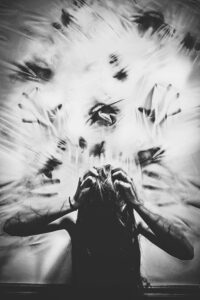 Trauma arises from an individual’s response to an event that is extraordinarily distressing psychologically, for example, an accident, violent act (e.g. sexual violence), war or natural disaster. Traumatic incidents are indiscriminate in terms of age and may cause lasting effects on an individual’s physical, emotional, mental and spiritual health. While every person’s experience of trauma is distinctive, there are symptoms and causes of untreated post-traumatic stress that are widely recognised. Trauma symptoms can comprise headaches, nausea, memory loss, denial, as well as erratic emotions. Prolonged symptoms can lead to changes in behaviour, cognition, and perceptual processes, ultimately impacting an individual’s daily life and personal connections. Unresolved trauma can lead to the recurrent reliving of the event, even in cases where there is no apparent connection between the initial incident and subsequent experiences at a conscious level. This may strengthen the individual’s reactions to distressing situations, amplifying the consolidation of behavioural and conceptual modifications as previously stated. These changes may persist for the duration of their lives, irrespective of their suitability or efficacy under specific circumstances, owing to the person’s distorted perspective.
Trauma arises from an individual’s response to an event that is extraordinarily distressing psychologically, for example, an accident, violent act (e.g. sexual violence), war or natural disaster. Traumatic incidents are indiscriminate in terms of age and may cause lasting effects on an individual’s physical, emotional, mental and spiritual health. While every person’s experience of trauma is distinctive, there are symptoms and causes of untreated post-traumatic stress that are widely recognised. Trauma symptoms can comprise headaches, nausea, memory loss, denial, as well as erratic emotions. Prolonged symptoms can lead to changes in behaviour, cognition, and perceptual processes, ultimately impacting an individual’s daily life and personal connections. Unresolved trauma can lead to the recurrent reliving of the event, even in cases where there is no apparent connection between the initial incident and subsequent experiences at a conscious level. This may strengthen the individual’s reactions to distressing situations, amplifying the consolidation of behavioural and conceptual modifications as previously stated. These changes may persist for the duration of their lives, irrespective of their suitability or efficacy under specific circumstances, owing to the person’s distorted perspective.
Dissociation is utilised as a coping mechanism.
 There is a well-documented connection between trauma, particularly childhood abuse or neglect, and the development of dissociative disorders. Dissociation is utilised as a coping mechanism, allowing individuals to separate themselves from an unbearable traumatic experience. Common symptoms of dissociative disorders include memory loss, physical disconnection from the body, emotional detachment, and loss of self-identity to name some. Dissociation can lead to problems in relationships, anxiety, depression, and self-harm. Dissociative Identity Disorder (DID), previously known as Multiple Personality Syndrome, is the extreme manifestation of these effects. DID causes identity confusion, resulting in a person’s personality fragmenting into one or more alternative personalities that aid them in coping with their abusive circumstances. Abuse has vast implications and a detrimental effect on our personal as well as our collective self perception, our way of life and has tainted our lineages. I would like to highlight that the timely addressing of issues faced by survivors of prolonged and repeated trauma is crucial in preventing them from the possibility of eventually perpetrating abuse themselves.
There is a well-documented connection between trauma, particularly childhood abuse or neglect, and the development of dissociative disorders. Dissociation is utilised as a coping mechanism, allowing individuals to separate themselves from an unbearable traumatic experience. Common symptoms of dissociative disorders include memory loss, physical disconnection from the body, emotional detachment, and loss of self-identity to name some. Dissociation can lead to problems in relationships, anxiety, depression, and self-harm. Dissociative Identity Disorder (DID), previously known as Multiple Personality Syndrome, is the extreme manifestation of these effects. DID causes identity confusion, resulting in a person’s personality fragmenting into one or more alternative personalities that aid them in coping with their abusive circumstances. Abuse has vast implications and a detrimental effect on our personal as well as our collective self perception, our way of life and has tainted our lineages. I would like to highlight that the timely addressing of issues faced by survivors of prolonged and repeated trauma is crucial in preventing them from the possibility of eventually perpetrating abuse themselves.
Our true identity lost in the ether of forgotten times.
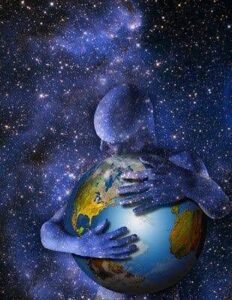 I would like to invite you to contemplate how our personalities have been moulded by a society, that has revered acts of violence and aggression throughout recorded history. Ultimately, the victor determines the storyline, and oppressors, are often charming and skilled in weaving narratives. We have witnessed that they wield their hypnotic power all too well. It is substantial to say, the probability that we have all been coerced on many levels into accepting this current reality as Truth, has been made possible through prolonged exposure to severe abuse and trauma. These circumstances have resulted in a species that is partially or completely disconnected from its essential nature. The way we used to communicate, our history, our way of life and our true identity lost in the ether of forgotten times. At some point in our history, in response to the emotional upheaval of pain, grief and loss, we collectively decided to fragment our soul and conscious awareness in order to create a fragmented new world reality that justified and rationalised the trauma and loss experienced by all. Consequently, we fashioned a world detached from our physical, emotional, intellectual and spiritual well being. We didn’t want to feel all the sorrow and pain. In due course, we were taught to disconnect from our bodily wisdom and to revere our intrinsic nature as a powerful and merciless force that resided in the distant heavens. Eventually we adopted the oppressive and parasitic ways that had been used to traumatise our species into submission, causing a disconnection from our spirit essence and bodies.
I would like to invite you to contemplate how our personalities have been moulded by a society, that has revered acts of violence and aggression throughout recorded history. Ultimately, the victor determines the storyline, and oppressors, are often charming and skilled in weaving narratives. We have witnessed that they wield their hypnotic power all too well. It is substantial to say, the probability that we have all been coerced on many levels into accepting this current reality as Truth, has been made possible through prolonged exposure to severe abuse and trauma. These circumstances have resulted in a species that is partially or completely disconnected from its essential nature. The way we used to communicate, our history, our way of life and our true identity lost in the ether of forgotten times. At some point in our history, in response to the emotional upheaval of pain, grief and loss, we collectively decided to fragment our soul and conscious awareness in order to create a fragmented new world reality that justified and rationalised the trauma and loss experienced by all. Consequently, we fashioned a world detached from our physical, emotional, intellectual and spiritual well being. We didn’t want to feel all the sorrow and pain. In due course, we were taught to disconnect from our bodily wisdom and to revere our intrinsic nature as a powerful and merciless force that resided in the distant heavens. Eventually we adopted the oppressive and parasitic ways that had been used to traumatise our species into submission, causing a disconnection from our spirit essence and bodies.
The confines of our collective mental framework.
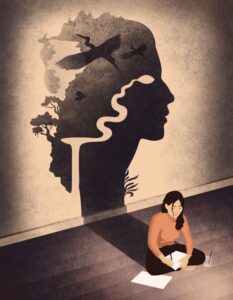 I can’t assure you beyond a shadow of a doubt that the story I’ve just put forward in the previous paragraph about our species is Universal TRUTH. It is simply what I have come to understand through my own experience, in my own path. It is like an analogy of my understanding, if you like. I know who and what we are. Do you? There are consequences to knowing who you are beyond any doubt. There is no doubt in my mind and I can only indicate towards what’s proven to be the right direction for me. But in the end everyone must cross their own T’s and dot their own I’s. Your path is between yourself and the Divine. Anyway, let’s have a look at what might be going on within the confines of our collective mental framework, and how we might bring all this information together. Is the reader able to recognise some of the symptomatology of dissociative disorders in our species or in themselves? Let’s skip some of the ‘lesser’ symptoms and go straight for the jugular, as they say. Let’s explore physical disconnection from the body, emotional detachment and loss of self-identity.
I can’t assure you beyond a shadow of a doubt that the story I’ve just put forward in the previous paragraph about our species is Universal TRUTH. It is simply what I have come to understand through my own experience, in my own path. It is like an analogy of my understanding, if you like. I know who and what we are. Do you? There are consequences to knowing who you are beyond any doubt. There is no doubt in my mind and I can only indicate towards what’s proven to be the right direction for me. But in the end everyone must cross their own T’s and dot their own I’s. Your path is between yourself and the Divine. Anyway, let’s have a look at what might be going on within the confines of our collective mental framework, and how we might bring all this information together. Is the reader able to recognise some of the symptomatology of dissociative disorders in our species or in themselves? Let’s skip some of the ‘lesser’ symptoms and go straight for the jugular, as they say. Let’s explore physical disconnection from the body, emotional detachment and loss of self-identity.
Physical disconnection from the body.
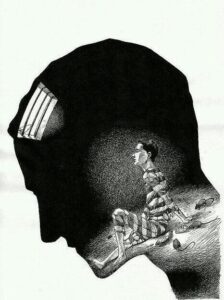
My contention would be that there is a physical disconnection from the body being manifest by our species generally. A person could have a sculpted body and still suffer from being disconnected from it on some level. This is why there is so much emphasis in the spiritual world on grounding work. Grounding in itself is a whole rollercoaster ride on the path. The more grounded we are, the more our empathic and other abilities start activating and calibrating them is a huge feat in itself. I’ve spoken about all this in previous posts. “Sentience is part of the divine experience” and “to be human is to be sensitive by nature in an extrasensory and magical fashion” are two quotes from my previous post that outlines this point. Unfortunately most people are ungrounded and only perceive their connection or lack of, to their bodies through the prism of the matrix mindset.
Emotional detachment.

As I previously discussed in “Rites of Passage, Life and Death” If recent events have demonstrated anything, it is that a vast part of the population is emotionally detached. Not only are they detached emotionally from themselves, but they are towards other people as well as of consequence. Many were terrified at the mere presence of another human being during the plandemic because they were told to. Many made a great sacrifice, seemingly for the greater good, I would go on to argue that the motivations were utterly selfish and self-centered for most, and based on a fear of dying and/or loosing their economic wealth. Why else would we have allowed so many atrocities to take place? The culling of our elderly. The abuse that our children had experienced to endure school. People literally wished illness and denial of medical services on those who defied the mainstream narrative and the poisonous jabs. I could go on as the examples are endless, but the point is made. Recognise the emotional detachment there amongst other things?
Loss of self-identity.
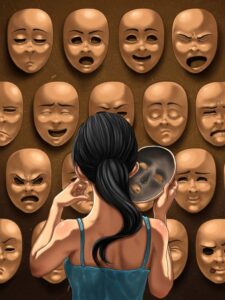
Regarding the loss of self-identity, in my experience and as I stated previously in “Humanity is Sacred” the central issue facing our species is that of identity. If we all knew who we really were beyond a shadow of doubt, we wouldn’t even be in this mess in the first place. If a portion of the population are still questioning wether, they are men or women, even though there is physical evidence between their legs, how can they ponder on our identity as a species? When a person or group of people believe themselves superior to the rest for whatever reason, they fail to realise that at the very end, the judgement and shadow they cast is ultimately a reflection of their own self image. If another portion of the population thinks Humanity is destroying our land and are the real problem, how they identify themselves and our species is clear. Even many who might consider themselves different, special or spiritual, would rather identify with alien races, angelic forces or a deity rather than being a human being. Even though there may or not be truth in their beliefs regarding their origins or identity, it is merely a sign that their spirit still is not fully reintegrated in their system.
This coping mechanism was created to deal with past collective traumas.
 The mainstream narrative recognises all forms of abuse that individuals may suffer for the greater good or otherwise. However, it fails to address the fact that the main perpetrators of abuse in our current reality are coming from within our own national institutions, from international institutions and from private organisations alike. The unscrupulous desires of these corporate entities require our species to continually sacrifice ourselves and perpetuate new layers of systemic abuse upon one another in order to remain in power. Without our consent, all this is not possible. It is time we rejected this way of life, withdrew our consent, and begun living in harmony and accordance with our true nature. I trust that you understand my argument regarding humanity’s trauma. Our species has disconnected from its innate essence due to repeated traumatic experiences. In some respects, it could be argued that humanity exhibits symptoms of Dissociative Identity Disorder, whereby we operate from a distinct persona that was created to deal with the aftermath of a particular situation or chain of traumatic events. This may underlie our tolerance of the present-day incoherent reality and our acceptance of a significant level of abuse and deceit as commonplace. Furthermore, it may account for our inability to recognise our true identity and purpose as a species. I’ll remind the reader, as he by now knows, that this coping mechanism was created to deal with past collective traumas. It is time to thank the program that we created as a means of protection for ourselves and committed this energy towards a new found purpose which is more aligned with what we want for ourselves now.
The mainstream narrative recognises all forms of abuse that individuals may suffer for the greater good or otherwise. However, it fails to address the fact that the main perpetrators of abuse in our current reality are coming from within our own national institutions, from international institutions and from private organisations alike. The unscrupulous desires of these corporate entities require our species to continually sacrifice ourselves and perpetuate new layers of systemic abuse upon one another in order to remain in power. Without our consent, all this is not possible. It is time we rejected this way of life, withdrew our consent, and begun living in harmony and accordance with our true nature. I trust that you understand my argument regarding humanity’s trauma. Our species has disconnected from its innate essence due to repeated traumatic experiences. In some respects, it could be argued that humanity exhibits symptoms of Dissociative Identity Disorder, whereby we operate from a distinct persona that was created to deal with the aftermath of a particular situation or chain of traumatic events. This may underlie our tolerance of the present-day incoherent reality and our acceptance of a significant level of abuse and deceit as commonplace. Furthermore, it may account for our inability to recognise our true identity and purpose as a species. I’ll remind the reader, as he by now knows, that this coping mechanism was created to deal with past collective traumas. It is time to thank the program that we created as a means of protection for ourselves and committed this energy towards a new found purpose which is more aligned with what we want for ourselves now.
We are a divine and beautiful species.

At present, it is my intention to acknowledge the all-encompassing foundation work and understanding of abuse, trauma and dissociative disorders that the fields of psychotherapy, bodywork and spirituality have provided. It is incredibly likely that our ongoing discussion would not have been possible without this previous groundwork. Thank You All.
It is not to cast judgement when I write these posts but to provide a basic intellectual understanding, according to my experience, of how I perceive the situation to be. If you can begin to perceive something that was previously hidden or blurry, then something can be done about it, right? If we choose to ignore the abuse that we have been enduring, even before the plandemic started, then we are doomed to keep on making the same choices based around a mindset of fear, misery and disease. Don’t you think that it is time to change all this? I am certain in my affirmation that we are a divine and beautiful species. I can only hope that the reader finds this out for him or herself. I pray that humanity awakens from the imprisoned mindset which limits us in every way imaginable and separates us from the rest of existence.
Hare Om Tat Sat
